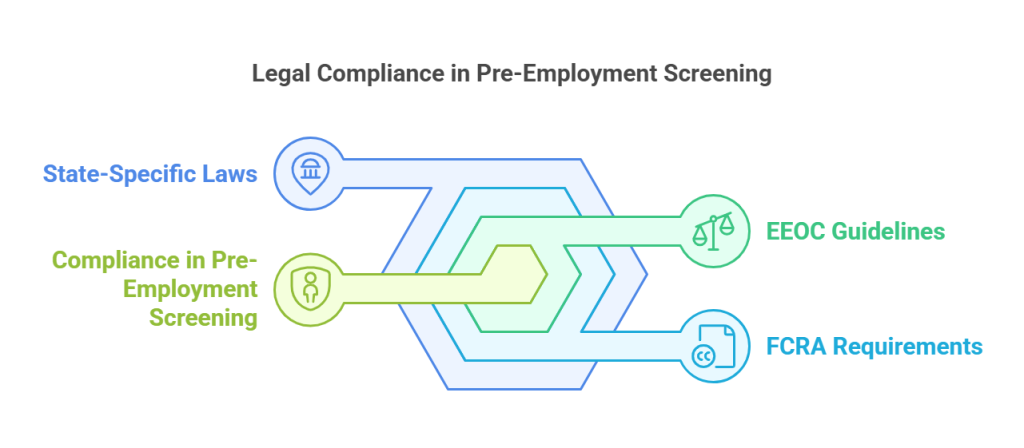When hiring, ensuring that your potential employees meet the necessary standards is crucial. Running background checks and drug tests can help you maintain a safe workplace, uphold company standards, and mitigate risks. But what exactly do these processes entail, and how do they intersect? This guide will answer all your pertinent questions, starting with a background check, including a drug test, and covering related topics crucial for business owners, HR professionals, and recruiters.
Key Takeaways
- Background checks and drug tests are essential for mitigating hiring risks and ensuring a safe and productive workplace.
- Employers must navigate various legal frameworks, including EEOC guidelines and FCRA requirements, to ensure compliant and fair screening processes.
- Background checks typically include criminal history, employment verification, education verification, and credit checks, while drug tests screen for illegal substances like marijuana, cocaine, and opioids.
- The sequence of conducting background checks and drug tests depends on industry practices. Sequential testing is cost-efficient, while simultaneous testing expedites the hiring process.
- Transparency and clear communication with candidates about the screening process, consent, and results handling are critical for maintaining trust and legal compliance.
Introduction
Hiring new employees can often feel like a high-stakes gamble. But what if you could stack the odds in your favor? That's where thorough vetting through background checks and drug tests comes in, acting like your ace in the hole. In today's competitive market, the assurance that you've covered all bases isn't just a luxury—it's a necessity.
Background checks generally dive into a candidate's history to verify their criminal record, employment history, educational qualifications, and sometimes financial standing. On the other hand, drug tests screen for the presence of illegal substances to ensure a drug-free workplace. Both are pivotal in filling in the complete picture of your potential hire.
This guide aims to demystify how these two vetting processes work independently and in tandem. Whether you're a seasoned HR professional or a business owner making your first hire, we'll arm you with the knowledge you need to execute effective and compliant background checks and drug tests. Ready to separate the best from the rest? Let's get started.

Background Checks: An Overview
Background checks are essential for hiring to ensure potential employees meet company standards and reduce risks. Here’s an outline of what they generally include and how they work.
What They Include
Employers typically look for several pieces of information when conducting a background check. These may include:
- Criminal History: This involves searching national and local databases to identify past criminal behavior. Knowing an applicant's criminal background can be crucial for high trust or security positions.
- Employment Verification: Accurate work history is key to assessing a candidate's experience and reliability. This step usually involves contacting previous employers to verify job titles, responsibilities, and dates of employment.
- Education Verification: For roles that require specific qualifications, verifying the candidate’s educational background ensures they possess the necessary credentials. This can range from high school diplomas to advanced degrees.
- Credit Checks: In certain industries, particularly those related to finance, an applicant’s credit history might be reviewed to assess their financial responsibility. This is more common for roles that involve managing money or sensitive financial information.
Legal Framework
Employers must navigate a patchwork of laws and guidelines when conducting background checks. Key legal frameworks include:
- Equal Employment Opportunity Commission (EEOC): The EEOC provides guidance to prevent discrimination in hiring practices. Employers must ensure that background checks do not disproportionately exclude certain groups unless the information is job-related for the position in question. For a more detailed understanding of EEOC guidelines, you can refer here.
- Fair Credit Reporting Act (FCRA): The FCRA outlines the legal requirements for obtaining, using, and disposing of consumer reports (including background checks). Under the FCRA, employers must get written consent from the candidate before conducting a background check and provide a copy of the report along with a “Summary of Rights” if any adverse action is taken based on the findings.
EXPERT INSIGHT: In a previous company, we were all shocked when one of our most respected, tenured leaders was found to have undisclosed drug-related issues. It was a stark reminder that appearances and credentials aren't always reliable indicators of a candidate's suitability. Upon investigating, I discovered that in the company's earlier days, consistent background checks weren't conducted. This oversight highlighted the critical need for thorough screening processes. You can never fully gauge someone's history based on surface impressions alone. To protect the integrity and safety of our organizations, it's essential that all qualified candidates undergo comprehensive background checks. Learn more about implementing effective screening procedures in this article. - Emile Garcia, SHRM-SCP, CHRP, CHRBP
Timing and Process
The timing of background checks can vary, but they are generally conducted at the later stages of the hiring process, often after a conditional job offer has been made. This approach helps ensure that resources are dedicated to candidates who are serious contenders for the position, optimizing both time and cost efficiency.
The process typically follows these steps:
- Consent: Obtain written consent from the candidate, as required by the Fair Credit Reporting Act (FCRA) and other applicable laws.
- Collection: Gather the necessary information such as personal identification details, employment history, and educational credentials, and submit it to a background check service provider.
- Review: Once the report is ready, review it thoroughly for any red flags or concerns. Pay close attention to discrepancies or any criminal records that might impact the role's requirements.
- Action: If issues arise, discuss them with the candidate and decide on the next steps—whether to proceed with hiring or not. It's important to provide the candidate with an opportunity to explain or clarify any findings, ensuring a fair and transparent hiring process.
This study from the National Research Council (US) and Institute of Medicine (US) Committee on Drug Use in the Workplace discusses the impact of drug-testing programs on productivity, highlighting the need for clear objectives and regular evaluation. Organizations should clearly articulate their objectives prior to initiating alcohol and other drug intervention programs and should regularly evaluate their programs in light of these objectives.
Understanding the components and legal aspects of background checks helps ensure a thorough and compliant hiring process, safeguarding both your business and potential employees. For a more comprehensive guide on this process, visit Background Checks & Drug Testing for additional insights and resources.

Drug Tests: An Overview
When it comes to drug tests in the hiring process, a little knowledge goes a long way. First off, let’s break down the kinds of drug tests you might encounter. The most common types include urine tests, hair tests, saliva tests, and blood tests. Each type has its advantages and drawbacks. Urine tests are popular due to their balance of cost and effectiveness, detecting substance use from a few days up to a month prior. Hair tests cover a longer history—up to 90 days—but they come with a higher price tag. Saliva tests are less invasive and can spot recent drug use, making them useful for immediate post-incident testing. Blood tests, the least common, are usually reserved for detecting current impairment due to their shorter detection window.
Now, you’re probably asking: what substances are these tests looking for? Commonly screened drugs include marijuana, cocaine, opioids, amphetamines, and PCP, among others. The specifics can vary based on employer requirements and local laws. Ever wondered about specifics like how long Delta-8 THC lingers in your system? It’s worth checking out detailed resources like How Long Does Delta-8 THC Stay in Your System? for in-depth information.
Legal considerations also play a significant role in drug testing. The legal landscape can be a minefield, given the variations in state laws. For instance, some states have legalized marijuana, but it remains banned on the federal level, complicating things for employers. Moreover, employers must ensure they’re not discriminating against candidates, especially those protected under the Americans with Disabilities Act (ADA). This means, in part, being cautious about how tests are administered and interpreting the results within the bounds of the law.
Understanding these elements can help you navigate the complexities of drug testing, ensuring you adhere to regulations and maintain a safe work environment.
Does a Background Check Include a Drug Test?
Short answer: No, a background check does not inherently include a drug test. They are two distinct processes that often go hand-in-hand during pre-employment screening but serve different purposes and follow different procedures.
Background checks typically focus on verifying a candidate's history and credentials. This can include criminal records, employment history, education verification, and even credit scores, depending on the role’s requirements. Essentially, a background check helps employers assess whether an applicant has been truthful about their past and if there are any red flags that might affect their job performance or pose a risk to the workplace.
On the other hand, drug tests are designed specifically to detect the presence of illicit substances or controlled medications in a candidate's system. These tests help ensure the applicant’s sobriety and, by extension, their ability to perform their job safely and effectively. Drug tests vary in method (urine, hair, saliva, blood) and substances screened (marijuana, cocaine, opioids, etc.).
Combined Screening
While they're separate processes, employers often bundle background checks and drug tests as part of a comprehensive pre-employment screening program. This combined approach provides a fuller picture of a candidate, balancing both their history and their current fitness for the role. However, just because they’re commonly conducted together doesn’t mean they’re the same thing or that one automatically includes the other.
Employer Policies
Employer policies can differ dramatically when it comes to combining these screenings. Some organizations may prioritize stringent drug testing policies due to the nature of their industry (e.g., healthcare, transportation) while others may place more emphasis on extensive background checks. Hence, it’s crucial for employers to transparently communicate their specific screening procedures during the hiring process.
Employers should provide candidates with clear information about what types of screenings they will undergo, why these screenings are important, and how the results will impact their employment consideration. This transparency aids in building trust and ensures candidates are adequately prepared.
Even though they’re separate, the complementary nature of background checks and drug tests streamlines the hiring process, making it more efficient and effective at vetting potential hires. Understanding this distinction and intersection is key for any business looking to maintain high standards and a safe, productive workplace.
Order of Operations: What Comes First?
When integrating background checks and drug tests into your hiring process, understanding the sequence of these screenings can streamline your workflow and alleviate candidate stress. Here's a breakdown of the standard practices:
Standard Practices
Generally, there's no one-size-fits-all rule regarding the sequencing of background checks and drug tests, but certain practices are commonly followed across industries. Most organizations start with the background check to ensure that the candidate's history aligns with company standards before investing time and resources in drug testing. Conducting background checks first can help eliminate unqualified candidates early in the process, thereby focusing resources only on viable hires.
Sequential vs. Simultaneous
- Sequential Testing: The advantage of conducting these tests sequentially—background check first, followed by a drug test—is cost efficiency. You avoid the expense of drug testing a candidate who might fail the background check. Sequential testing also minimizes candidate fatigue, as candidates only need to deal with one screening at a time.
- Simultaneous Testing: On the other hand, simultaneously performing both checks can speed up the hiring process. This method is useful for industries with high turnover or urgent staffing needs, as it reduces screening time. However, the downside is the cost, as it may involve testing candidates who would have been filtered out by a background check.
In essence, while sequential testing prioritizes resource efficiency, simultaneous testing optimizes for speed. The choice between the two approaches largely depends on your company's immediate needs and the specific demands of your industry.
Industry-Specific Practices
Staffing Agencies
Staffing agencies operate in a unique space where they bridge gaps between employers and potential candidates. Given the variety of clients they serve, staffing agencies often have a rigorous process for both background checks and drug tests to ensure that they provide reliable and qualified employees. The process typically includes an initial comprehensive background check followed by a drug test tailored to the client's specific needs. This dual screening ensures the match between the employee's profile and the employer's criteria, whether they're short-term gigs or long-term assignments.
Healthcare
In the healthcare industry, the stakes are particularly high. Ensuring patient safety and maintaining trust is paramount, which is why healthcare institutions adopt stringent screening protocols. Background checks often include a thorough review of professional licenses, malpractice histories, and any criminal record related to previous patient care. Drug tests are equally meticulous, frequently going beyond the standard panels to include substances that may impair medical judgment. This stringent vetting is critical to safeguarding patient health and maintaining the institution's credibility.
Transportation
The transportation sector is heavily regulated, particularly by bodies such as the Department of Transportation (DOT). Employers in this industry must abide by strict regulatory requirements for both background checks and drug testing. Background checks typically include a review of driving records, criminal history, and past employment, ensuring that only the most responsible and experienced drivers are hired. Drug tests often follow DOT regulations, which mandate testing for alcohol and a spectrum of drugs, minimizing the risks of accidents and ensuring public safety.
Retail and Hospitality
In retail and hospitality, maintaining a safe and trustworthy environment is crucial, both for the customers and the staff. While these industries might not require as rigorous background checks as healthcare or transportation, they still prioritize safeguarding against theft and ensuring a drug-free workplace. Background checks often focus on criminal records and past employment verification to rule out potential risks of theft or misconduct. On the other hand, drug tests serve to ensure that the employees are fit for customer-facing roles, helping maintain a professional and reliable service environment.
Internal Resource: For more on the specifics of drug testing, refer to How to Dispute a False Positive Drug Test: Best Practices. This resource can offer additional guidance on handling false positives, a concern relevant across all industries, ensuring that you manage these situations fairly and effectively.

Legal Considerations and Compliance
EEOC Guidelines
Navigating the landscape of pre-employment screening involves adhering to several legal standards, with the EEOC guidelines serving as a cornerstone. The Equal Employment Opportunity Commission (EEOC) provides directives to ensure that background checks and drug tests do not result in discriminatory practices. Employers must ensure their screening processes are applied consistently across candidates to avoid disparate treatment or impact. Crucially, the EEOC mandates that the information obtained must be relevant to the job and used fairly. For a deeper dive into these guidelines, you can refer to the "EEOC".
FCRA Requirements
The Fair Credit Reporting Act (FCRA) plays a significant role in how background checks are conducted, particularly concerning consumer reports. Employers are required to obtain written consent from candidates before performing a background check. Additionally, if a decision is made based on the report, the candidate must receive a pre-adverse action disclosure, including a copy of the report and a summary of rights under the FCRA. This legislation aims to ensure that candidates have the opportunity to dispute inaccuracies. For more detailed information, the "FTC" offers comprehensive guidance.
State-Specific Laws
Beyond federal requirements, state-specific laws add another layer of complexity. Each state has its own regulations governing the scope and use of background checks and drug tests. For instance, some states have "ban-the-box" laws, restricting employers from requesting criminal history information on job applications. Others might offer protection to candidates with medical marijuana prescriptions. Therefore, it’s vital for employers to stay informed about the legislative landscape in the states where they operate to ensure compliance. Ignoring these nuances can result in legal repercussions and undermine the fairness of the hiring process.

Preparing Candidates
Setting Expectations
One of the first steps in preparing candidates for background checks and drug tests is setting clear expectations. Start by notifying them early in the hiring process that these screenings are a part of your company’s standard procedure. Clear communication from the onset can ease tension and demonstrate to candidates that your organization values transparency and due diligence.
Transparency and Consent
Transparency is not just a best practice; it's a compliance necessity. Make sure to obtain explicit consent before proceeding with any background checks or drug tests. Provide candidates with information about what each test entails, including what you will be looking for and how the data will be used. This can be done through written consent forms, during face-to-face interviews, or via electronic communication. Transparency fosters trust and enables candidates to fully understand the process they're entering into.
Handling Results
When it comes to handling and discussing results, it’s crucial to have a plan in place. If a background check or drug test returns red flags, approach the conversation with sensitivity. Explain the findings clearly and provide the candidate with an opportunity to explain any discrepancies or positive results. In some cases, there might be errors or valid explanations that need to be considered before making a final decision. Handling results professionally ensures that your company maintains a respectful and fair hiring process, and mitigates potential legal issues.
Frequently Asked Questions (FAQ)
Does a background check include a drug test?
Not automatically. While both background checks and drug tests are often part of the pre-employment screening process, they are conducted separately. A background check typically reviews criminal history, employment verification, and more, while a drug test specifically screens for substances.
Does Amazon drug test at the pre-hire appointment?
Yes, Amazon generally requires a drug test as part of the pre-hire process. These tests usually occur after a conditional job offer has been made.
What comes first: drug test or background check?
Industry standards vary, but typically, employers conduct the background check first and follow up with a drug test. Some employers might perform these tests simultaneously to expedite the hiring process.
What do pre-employment drug tests look for?
Most pre-employment drug tests screen for substances including marijuana, cocaine, opioids, amphetamines, and PCP. The exact substances may vary based on employer policies and state regulations.
What should candidates expect during the screening process?
Candidates should expect clear communication about what the process entails, including any forms of testing that will be performed. It's crucial to provide consent and understand how the results may impact the hiring decision.
Conclusion
To wrap things up, let's underline the pivotal takeaways. Conducting both background checks and drug tests is essential to safeguard your workplace and mitigate unnecessary risks. These screenings, while distinct in their focus, together provide a comprehensive view of a candidate's suitability.
Background checks give insight into the candidate's history, confirming their credentials and revealing any potential red flags. Drug tests ensure potential hires adhere to company substance use policies, promoting a safe and productive environment.
Why is this so important? Simple. A thorough vetting process protects your organization from potential liabilities and fosters a trustworthy workplace culture. It's an investment in quality—quality of hires, quality of work, and ultimately, quality of your company’s reputation.
Embrace these practices not as hurdles but as essential steps in building a robust team. Understand the legal landscape, remain transparent with candidates, and always seek to streamline your processes for efficiency and compliance. With these elements in place, you’re not just hiring; you’re building a foundation for success.
Additional Resources

GCheck Editorial Team
Meet the GCheck Editorial Team, your trusted source for insightful and up-to-date information in the world of employment background checks. Committed to delivering the latest trends, best practices, and industry insights, our team is dedicated to keeping you informed.
With a passion for ensuring accuracy, compliance, and efficiency in background screening, we are your go-to experts in the field. Stay tuned for our comprehensive articles, guides, and analysis, designed to empower businesses and individuals with the knowledge they need to make informed decisions.
At GCheck, we're here to guide you through the complexities of background checks, every step of the way.






